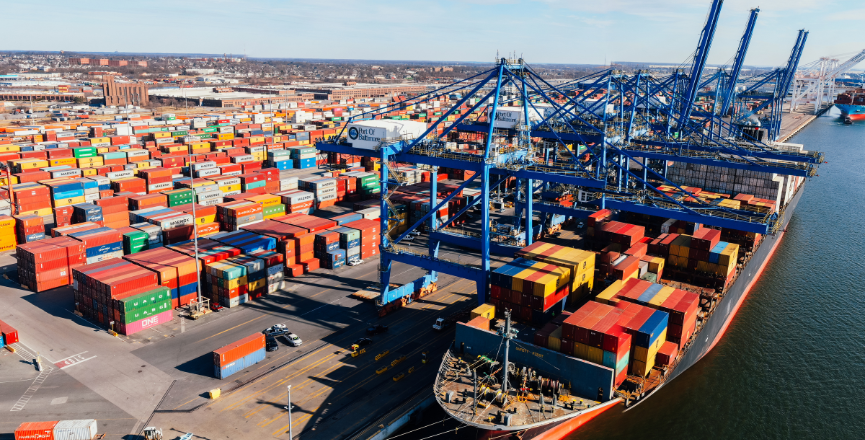Unless you’ve been living under a rock, you’ve probably heard about the recent port strikes disrupting major supply chains across the country. But did you know this could impact public assistance programs and affordable housing across the nation? Port strikes don’t just slow down goods; they can also create ripple effects that hit public housing projects, low-income families, veterans’ programs, and disability assistance. Let’s explore how this happens and what it could mean for people who rely on these critical services.
What Is a Port Strike?
A port strike happens when workers at the ports stop working to demand better pay, working conditions, or benefits. These strikes cause delays in goods being shipped in and out of the country. Since ports are crucial for moving products like food, building supplies, and other essential goods, any disruption can lead to shortages and rising costs. While this may seem like a problem limited to shipping companies, it can have a big impact on everyday people—especially those who rely on public assistance and affordable housing.
Why Would a Port Strike Affect Public Assistance and Affordable Housing?
Many public assistance programs and affordable housing initiatives depend on the steady flow of goods and services that come through ports. These programs serve some of the most vulnerable populations, including low-income families, veterans, and people with disabilities. When a port strike interrupts the supply of essential goods—like building materials for housing projects or food for assistance programs—it can cause delays and increased costs that make it harder for these services to function properly.
Effects on Affordable Housing Nationwide
• Construction Delays: Public housing projects, as well as affordable housing developments, rely heavily on imported building materials such as lumber, steel, and appliances. A port strike can delay the arrival of these supplies, slowing down or halting construction on low-income housing projects. This can lead to fewer affordable housing options becoming available, especially in areas that are already facing a housing crisis.
• Increased Costs for Public Housing: If the cost of materials increases due to shortages caused by a port strike, public housing developers may struggle to keep projects within budget. This could result in fewer units being built or completed, putting even more pressure on the already limited supply of affordable housing.
Public Assistance Programs Under Pressure
• Food Assistance Programs: Many public assistance programs, such as the Supplemental Nutrition Assistance Program (SNAP), rely on the availability of affordable food. Port strikes can disrupt the import of food products, leading to higher prices. This, in turn, could strain food assistance programs, making it harder for low-income families to access the food they need.
• Veterans and Disability Programs: Veterans assistance programs, including those that provide housing or other forms of aid, could face delays in receiving supplies or resources needed for their operations. Similarly, programs that offer disability support might struggle if the costs of medical supplies or equipment rise due to import delays. This could make it harder for veterans and individuals with disabilities to receive the care and services they need.
• Energy and Utility Assistance: Programs like the Low Income Home Energy Assistance Program (LIHEAP) help people cover the cost of heating or cooling their homes. A port strike that increases the price of energy supplies or essential goods could lead to a higher demand for these programs, potentially exceeding the available resources.
Nationwide Economic Effects and Job Losses
• Job Losses in Key Sectors: Port strikes can have a ripple effect on industries that rely on imports, such as construction, manufacturing, and retail. If these industries are forced to slow down or stop operations, layoffs may occur. As more people lose their jobs, the demand for public assistance programs, like unemployment benefits, could increase, placing additional pressure on government resources.
• Affordable Housing Projects at Risk: Many affordable housing projects rely on government grants or public-private partnerships. If the cost of building materials rises due to delays caused by a port strike, these projects could face cancellation or significant delays, reducing the availability of affordable housing for low-income families across the country.
Long-Term vs. Short-Term Effects on Assistance and Housing
In the short term, a port strike may lead to temporary delays and price increases, causing minor disruptions to public assistance programs and housing projects. However, if the strike lasts for a prolonged period, the consequences could be much more severe. The increased cost of goods and services, combined with economic slowdowns and job losses, could overwhelm public assistance programs and stall critical affordable housing projects for months, or even years.
What could this mean for you?
A port strike can create challenges far beyond the shipping industry, potentially impacting public assistance programs and affordable housing developments across the country. Vulnerable groups, including low-income families, veterans, and individuals with disabilities, could face even greater difficulties in accessing essential resources. As goods become scarcer and costs rise, these effects will be felt more widely, especially if the strike continues for an extended period. How much will this port strike impact public assistance and affordable housing in Florida and beyond? Only time will tell.



